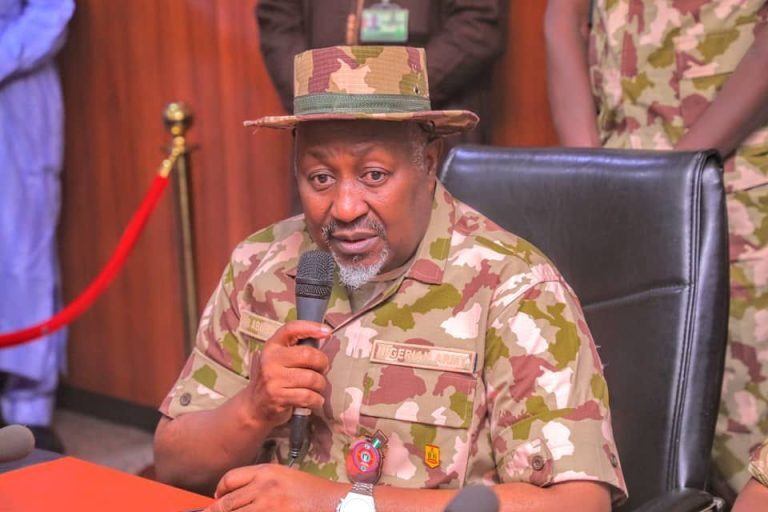Badaru while inaugurating the Special Operations Forces for the Armed Forces of Nigeria at camp Kabala in Jaji military cantonment, Kaduna State, said they would be engaged in rapid response missions.
He also said that the initiative was part of new strategies to address the lingering security issues in the country.
He noted that the evolving nature of contemporary security challenges, demanded for an elite force that was well-equipped and well-trained in advanced tactics, including unconventional warfare, intelligence-driven operations, and rapid response missions.
He added that the vision was to build a highly skilled, agile, and mission-ready force capable of executing specialised operations in diverse and complex environments.
The minister explained that the training of the special force would help enhance operational effectiveness in combating terrorism, insurgency, transnational crimes, and other asymmetric threats that were bedeviling the nation.
He further said the elite force would serve as a critical pillar in securing Nigeria’s national sovereignty, protecting citizens, and maintaining peace and stability within and beyond the nation’s borders.
“This training has been meticulously designed to develop highly skilled personnel in special combat tactics, counterterrorism operations, intelligence gathering and hostage rescue missions.
“The program will prepare trainees for high-risk missions in both urban and hostile environments, ensuring they can adapt to dynamic threats.
“Given the inter-agency nature of modern security challenges, the training will foster seamless collaboration among personnel of the Nigerian Army, the Nigerian Navy, and the Nigerian Air Force, as well as other security agencies”, he said.
The defence minister added that special operations required not only technical skills but also mental toughness and endurance.
He noted that in view of that, the training would test and refine the physical and psychological resilience of the troops, emphasise leadership under pressure, foster sense of duty, discipline, and camaraderie among the participants.
He added that it was expected that at the end of the rigorous training programme, the Armed Forces would have a force capable of conducting high-impact operations with precision, speed, and efficiency.
According to him, such abilities will be a significant improvement in Nigeria’s ability to neutralise threats and respond proactively to security challenges.
“The newly trained special operations force will be deployed to critical areas across the country, reinforcing our national security architecture.
“This inauguration is for the first batch of 800 out of 2,400 to be trained as part of a long-term strategy to develop world-class special operations capability within the Armed Forces of Nigeria.”
Badaru assured that Nigeria would continue to collaborate with allied nations and international defence institutions to adopt best practices and improve interoperability in joint operations.
He charged the personnel on dedication, resilience, and commitment to duty, urging them to give their best, push beyond limits, and embrace the honour of being part of the elite force.
He thanked President Bola Tinubu for his support and investment in security by providing state-of-the-art equipment and prioritising the welfare of personnel.
In a remark, the Chief of Defence Staff (CDS), Gen. Christopher Musa, said the training was a significant milestone in the history of the Armed Forces and its commitment to enhancing national security, driven by well-equipped personnel with the necessary skills and capabilities to address contemporary challenges.
Musa said modern warfare demanded that forces be well-trained, equipped, and capable of responding swiftly, effectively and decisively.
He thanked the Federal Government, saying that that the initiative will significantly actualise his leadership concept of “nurturing a professional Armed Forces of Nigeria that is people-centric, capable of meeting its constitutional responsibilities in a joint and collaborative environment”.
The CDS urged the trainees to embrace the challenges and responsibilities that lie ahead with an unwavering spirit, stressing that the training would be rigorous and tough, but scalable with the right dedication and mindset.
Similarly, Gov. Uba Sani of Kaduna State said that the training was a testament to the nation’s unwavering commitment to strengthening Nigeria’s security architecture, combating emerging threats, and ensuring the safety of the country.
Represented by his Deputy, Dr Hadiza Balarabe, the governor noted that in today’s security environment, the threats faced by the nation, kept evolving, from terrorism, insurgency, and banditry to cyber threats and transnational crimes.
“In response to these, we must equip our Armed Forces with the best training, cutting-edge tactics, and the resilience needed to overcome these challenges.
“This special operations force training is a bold step towards preparing a new generation of elite troops capable of defending our sovereignty with precision, intelligence, and courage,” he said.
He added that the situation Nigeria found itself, had made it expedient to adapt, innovate, and provide the trainees with skills to not only prepare them for the battlefield but take sound decisions in high-pressure situations.
“As the host state for this landmark training, we take great pride in supporting the military in its noble duty.
“We recognise the sacrifices of our men and women in uniform and remain committed to fostering a conducive environment for this training to succeed.
“Our state has always stood firmly behind our Armed Forces, and we will continue to provide every necessary support to ensure the success of this initiative, ” Sani said.
He charged the trainees to stay focused, embrace discipline, and commit themselves to the training with dedication and honour it deserves.
“I urge all of you to face the challenge you may face ahead with determination and grit because you are not just training to become soldiers, you are preparing to be the guardians of freedom and defenders of peace,” Sani further said.
He commended the Federal Government, the Ministry of Defence, and the leadership of the Armed Forces of Nigeria for the vision in inaugurating the training programme.
The News Agency of Nigeria (NAN), reports that the special operations force training is a critical step towards enhancing Nigeria’s security capabilities and addressing evolving threats.(NAN)









